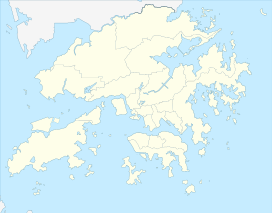Kowloon Peak,[1] also known as Fei Ngo Shan (literally: "Soaring Goose Mountain", Chinese: 飛鵝山), is a 1,975-foot-tall (602 m) mountain in the northeast corner of New Kowloon, Hong Kong, situated in Ma On Shan Country Park.[2] With the summit located just to the east of the border between Wong Tai Sin and Sai Kung districts,[3] it is the tallest mountain in Kowloon, and is crossed by both the Wilson Trail and the MacLehose Trail.
| Kowloon Peak | |
|---|---|
| 飛鵝山 | |
 View of Kowloon Peak | |
| Highest point | |
| Elevation | 602 m (1,975 ft) Hong Kong Principal Datum |
| Coordinates | 22°20′27.16″N 114°13′23.64″E / 22.3408778°N 114.2232333°E |
| Geography | |
| Location | |
| Kowloon Peak | |||||||||||||||||
|---|---|---|---|---|---|---|---|---|---|---|---|---|---|---|---|---|---|
| Traditional Chinese | 飛鵝山 | ||||||||||||||||
| Simplified Chinese | 飞鹅山 | ||||||||||||||||
| Cantonese Yale | Fēi ngòh shāan | ||||||||||||||||
| Literal meaning | Soaring Goose Mountain | ||||||||||||||||
| |||||||||||||||||
On the lower slopes of Tung Yeung Shan about 1.1 miles (1.8 kilometres) to the north is the Gilwell Campsite, belonging to The Scout Association.
Geography
editKowloon Peak has a steep slope facing south towards northwestern Kowloon,[clarify] while having a relatively smooth curve towards the east and west. The peak connects with Middle Hill (象山), known also as Cheung Shan, and Tung Shan (東山) in the north,[3] forming a ridge of mountains.[4] Despite being in an easily accessible location by car and walks, there are occasional sighting reports of Burmese pythons,[5] East Asian porcupines,[6] red muntjacs[7] and wild boars.[8]
Geology
editKowloon Peak consists mainly of volcanic rocks (many of which are tuffs), and blocks of granite at the base of the mountain.[4]
Hiking and access
editThere are several paths from Jat's Incline and Fei Ngo Shan Road that lead to the summit. One of Hong Kong's most treacherous and dangerous climbs is the rock climb from Clear Water Bay Road to Kowloon Peak's summit through Suicide Cliff.
Suicide Cliff is not necessarily a place where people commit suicide, but it is such named most likely because the climb is so treacherous, it is akin to committing suicide. The hike has also seen numerous injuries and fatalities.[9][10][11] In one instance, two Chinese tourists ran into trouble on Kowloon Peak's Suicide Cliff and caused an extensive rescue operation involving 160 firefighters.[12]
For casual hikers, choosing the easiest path to the summit through Fei Ngo Shan Road is recommendable.
See also
editReferences
edit- ^ "GeoInfo Map.Map of Hong Kong provided by HKSARG". www.map.gov.hk. Retrieved 2021-04-14.
- ^ "飛鵝山 Fei Ngo Shan/ Kowloon Peak". www.hiking.com.hk. Retrieved 2019-10-26.
- ^ a b "DCCA/2000/H" (PDF).
- ^ a b Agriculture, Fisheries and Conservation Department (2006-10-17). Central Ridge and West (in English and Chinese). Hong Kong: Cosmos Books Limited. p. 57. ISBN 9882113273.
- ^ "Burmese Python – Python bivitattus". HongKongSnakeID.com. Retrieved 2024-01-28.
- ^ Wildcreatures (2018-03-19). "Mammals: Porcupine". WildcreaturesHK. Retrieved 2024-01-28.
- ^ Dewolf, Christopher (2020-12-15). "Hong Kong's Wild Animals, Part III: Barking Deer". Zolima City Magazine. Retrieved 2024-01-28.
- ^ "Wild Pig Nuisance". www.afcd.gov.hk. Retrieved 2024-01-28.
- ^ "Hiker dies after falling down steep slope in Hong Kong country park". South China Morning Post via sg.news.yahoo.com. Retrieved 2020-04-29.[dead link]
- ^ "Another hiker killed". The Standard. Retrieved 2019-10-26.
- ^ "6 girls rescued at Kowloon Peak after getting lost on hike since yesterday". www.msn.com. Retrieved 2019-10-26.[dead link]
- ^ "Hikers underestimate danger of 'suicide cliff' in Hong Kong". South China Morning Post. 2017-08-28. Retrieved 2019-10-26.
